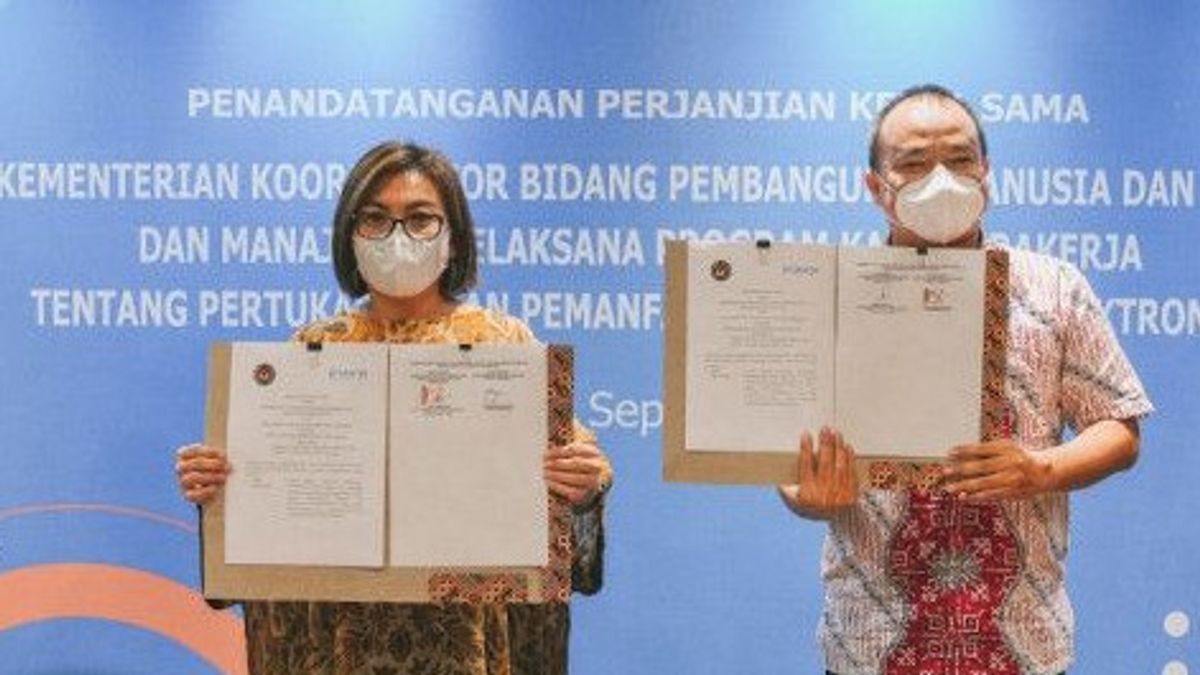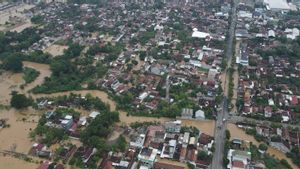JAKARTA - The government has started the integration of Pre-Employment Card data with the Coordinating Ministry for Human Development and Culture to sharpen the social assistance target (bansos) for the sake of eradicating extreme poverty.
"Efforts to integrate data in the central and regional governments, ministries and institutions can target social assistance more sharply," said Deputy for Digital Economic Coordination, Employment, and Micro, Small and Medium Enterprises at the Coordinating Ministry for the Economy, Rudy Salahuddin, Tuesday evening, September 13.
The integration process was carried out through the signing of the Electronic Exchange Cooperation Agreement and Electronic Data Utilization between the Coordinating Ministry for Human Development and Culture (PMK) and the Managing Management of the Pre-Employment Card Program.
Rudy, who also serves as the Chief Executive Team of the Job Creation Committee, said that the exchange and use of data in question is the Targeting Data on the Acceleration of the Elimination of Extreme Poverty (P3KE) originating from cross agencies in coordination with the P3KE Data Management Task Force of the Coordinating Ministry for Human Development and Culture.
The initial goal of data preparation is to achieve zero percent extreme poverty by 2024. The data has state-of-the-art social-economic information and the welfare ranking of individual residents by name by address.
As of June 21, 2022, P3KE data that has been successfully matched with Dukcapil data and has a population identification number validity of more than 80 percent.
P3KE data can be used by Pre-Employment Cards in support of poverty alleviation efforts. On the other hand, data from the extreme poor who have received training on the Pre-Employment Card Program can be a database for other empowerment programs, such as micro-credit programs," he said.
In its two years of implementation, the achievement of the Pre-Employment Card Program is able to reach 14.3 million. The Pre-Employment Card Program is also inclusive because it reaches marginalized communities, with 87 percent of recipients unemployed when registering, 59 percent living in villages and 3 percent coming from underdeveloped districts.
"With the P3KE Data, we can see overlay or the data unification process between Pre-Employment Card recipients and P3KE Data," he said.
On the same occasion, Deputy for Coordination for Social Welfare Improvement at the Coordinating Ministry for Human Development and Culture Andie Megantara said P3KE data is additional data to complement socio-economic data that previously existed to increase government interventions that are right on target in dealing with poverty.
In addition, the P3KE Data can also be used by the Ministry of Social Affairs for updating the Integrated Social Welfare Data (DTKS) and the Financial and Development Supervisory Agency (BPKP) as well as overseeing the data.
The Executive Secretary of the National Team for the Acceleration of Poverty Reduction (TNP2K) Suprayoga Hadi said that the matching of Pre-Employment Card and P3KE data could be related to efforts to empower the poor.
"From this matching, we can see where the Pre-Employment Card Program slices are with other social assistance," he said.
The Executive Director of Pre-Employment Management for the Pre-Employment Card Program, Denni Purbasari, said the Pre-Employment Card Program is ready to use P3KE Data to further accelerate efforts to reduce extreme poverty.
The Pre-Employment Card Program Implementation Management is ready to facilitate this activity. We will also explore data and be open to data matching, both self-targeting and prioritizing certain segments better," he said.
The signing of the Cooperation Agreement was also witnessed by Raden Murwantara from the Supreme Audit Agency (BPK), Tri Windiarto from the Central Statistics Agency (BPS), Edy Santoso from the Presidential Staff Office (KSP) and Sudarno Sumarto from TNP2K.
The English, Chinese, Japanese, Arabic, and French versions are automatically generated by the AI. So there may still be inaccuracies in translating, please always see Indonesian as our main language. (system supported by DigitalSiber.id)













